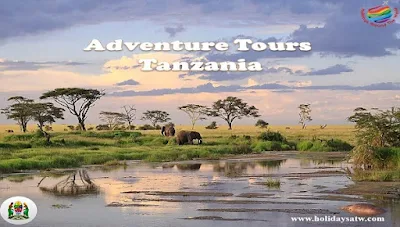Tourists flock to Tanzania's enchanting beaches and safari parks to
explore some of the most diverse wildlife environments in the Serengeti,
Ngorongoro and Ruaha National Parks.
Tourists come to Tanzania from all over the world to enjoy the coral
reefs, the colourful fish and the clear waters. You can also reach the
island of Zanzibar after a short boat trip from Dar es Salaam to enjoy its
white sandy coasts and farms that smell of spices and spices, in a real
mix of African, Middle Eastern and Indian cultures, which is reflected in
its best form in the local cuisine of that island. Tanzania also has the
highest mountain in all of Africa, Mount Kilimanjaro, which attracts large
numbers of mountaineering enthusiasts.
Tanzania location
Tanzania is located in eastern Africa south of the equator, bordered by
Kenya and Uganda to the north, Rwanda, Burundi and the Democratic Republic
of the Congo to the west, Zambia, Malawi and Mozambique to the south, and
the Indian Ocean to the east. Most of the territory of Tanzania lies at an
altitude of more than 200 meters except for the narrow coastal belt of the
mainland and offshore islands.
Tanzania has a humid tropical climate, although it includes several types
of climate. In the coastal lowlands, the weather is hot and humid,
especially on the shore of the Indian Ocean, and in the central and southern
regions, the weather is dry, as temperatures decrease at the heights and rain
increases on the slopes. The average precipitation is about 750 mm
annually.
Best time to travel to Tanzania
Tanzania has a subtropical climate where there is no bad time to travel,
the dry winter season which lasts from June to October and the summer
rainy season which lasts from November to April. Because every season has
its own unique set of pros and cons.
For the best weather, plan to visit during the dry season as vegetation
is less dense, which makes spotting wildlife much easier. You will also
need to travel between December and March, to enjoy the Great Migration as
herds of migratory wild animals breed, attracting many predators. In
the summer there are impressive numbers of rare migratory birds, flamingos
inhabiting the lakes when the water levels are high. November and April
can be rainy but benefit from fewer visitors and lower prices.
 |
| Magnificent feral cows |
In this article, we will learn about the most important tourist places in
Tanzania.
Tourist places in Tanzania
Dar es Salaam is a wonderful city overlooking the coast of the Indian
Ocean, and one of the most beautiful tourist destinations in Tanzania. It
carries among its halls a guide to the country's antiquity, museums that
preserve rare collectables throughout the ages, in addition to luxury
shopping centres, popular markets, and more in one of the most
beautiful cities of the continent.
The most important tourist places in Dar es Salaam... Read more
Zanzibar Island in Tanzania is characterized by its scenic beauty, which
includes white sand beaches and palm trees that fill its parts.
It is considered one of the most beautiful tourist destinations in
Tanzania, where tourists from all over the world come to enjoy various water
activities such as diving, surfing, kayaking and many more.
The most important tourist places in Zanzibar
Zanzibar is a major holiday destination in Tanzania and is famous for its
beautiful beaches that feature fine white sand and clear shallow waters
along with traditional boats lining the shore. You can visit the historic
city of Stone Town, known for its ancient Arab houses, narrow alleys and a
busy harbour... Read more
Mafia Island, Tanzania
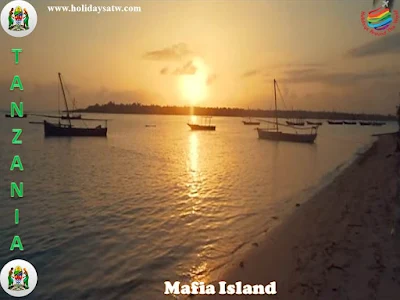 |
| Mafia Island, Tanzania |
It is part of the Mafia Quiet Islands. off the coast of Dar es Salaam.
It is famous for its coconut palms and uncrowded beaches. Mafia Island
attracts divers and snorkelers from all over the world to the safe
undersea world thanks to its coral gardens, an abundant variety of fish
and a relaxing diving atmosphere. Countless birds and more than 400
species of fish can be seen in the area as well as green turtles.
You can also admire more than a hundred species of birds found along
the nature trails in the wooded interior. And do not forget to visit the
historical ruins of Koa, which are estimated to be 850 years old.
Mafia Island, Tanzania location on Google Maps
Pemba Island, Tanzania
 |
| Pemba Island, Tanzania |
Known as the Green Island, it is part of the Zanzibar archipelago,
surrounded by many desert islands, and is one of the best scuba diving
places in the Indian Ocean, for adventure lovers, there are mountain
bike trails. Pemba Island is one of Tanzania's lesser-known islands,
with lush hills, clove plantations, mangrove forests, caves, secluded
lagoons, pink and white sand beaches and coloعrful coral reefs.
Pemba Island is famous for diving and fishing, where marine life is
rich in all kinds of creatures from turtles, barracudas, swordfish, reef
sharks, yellowfin tuna, and Napoleon fish.
The island has a rich history, so be sure to visit the main town, Chak
Chak, its museum, and the ruins of its fortress from the 18th
century.
Pemba Island, Tanzania location on Google Maps
Lake Victoria, Tanzania
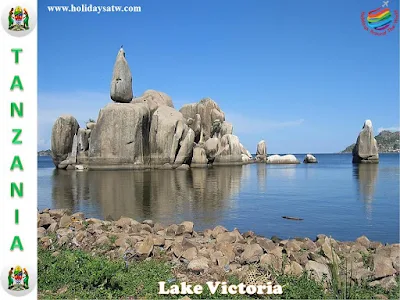 |
| Lake Victoria, Tanzania |
Lake Victoria is the largest freshwater lake in Africa and is bordered by
Kenya, Tanzania, and Uganda. Stretching for more than 300 kilometres (186
mi) from north to south, the lake features many archipelagos and shallow
reefs. There are many scenic islands, this lake is the source of the White
Nile and provides income to millions of residents along its shores. Bird-watching and fishing trips, boat trips or hiking can be taken around Lake
Victoria.
Lake Victoria, Tanzania location on Google Maps
Mount Kilimanjaro, Tanzania
 |
| Mount Kilimanjaro, Tanzania |
Mount Kilimanjaro is the highest peak in Africa with a height of 5,895
meters. It is also the most prominent tourist attraction in Tanzania. The
mountain was formed more than a million years ago by a volcanic eruption
along the rift valley. The mountain includes 3 volcanic cones; Shira, Kibo,
and Mawenzi. The mountain's rainforest slopes are home to buffaloes, tigers,
monkeys, and elephants.
Mount Kilimanjaro attracts large numbers of mountaineering enthusiasts who
come every year on this exciting adventure. If you plan to climb Mount
Kilimanjaro, you must register with a local authority.
Mount Kilimanjaro, Tanzania location on Google Maps
Serengeti National Park, Tanzania
 |
| Serengeti National Park, Tanzania |
The Serengeti National Park is famous for its annual wildebeest migration
and is home to 500 species of birds. Serengeti National Park, the
second-largest national park in Tanzania, attracts dozens of wildlife-viewing tourists from December to June. If you can choose the time of
your visit, you will enjoy the once-in-a-lifetime experience of witnessing
the migration of the magnificent feral cows in the Serengeti.
 |
| Magnificent feral cows in the Serengeti |
Wildebeest Migration in Serengeti National Park, Tanzania. Each year,
enormous herds of wildebeest and zebra move thousands of kilometres across
the Serengeti-Mara. These herds have a pivotal role in maintaining the
ecosystem.
Serengeti National Park, Tanzania location on Google Maps
Lake Manyara National Park, Tanzania
 |
| Lake Manyara National Park, Tanzania |
Lake Manyara National Park is made up of forests, grasslands, and swamps
that host thousands of flamingos. Some activities can be practised in the
garden such as mountain biking tours, bird watching, kayaking and marine
life.
The calm waters are often adorned with herds of swans and flamingos and
are complemented by wetland forests, grasslands, and acacias. Evergreen
forests around the lake with the sound of noisy hornbills and guinea fowl.
And while you're there, watch the unique lions climb trees in Lake
Manyara.
Lake Manyara National Park, Tanzania location on Google Maps
Ruaha National Park, Tanzania
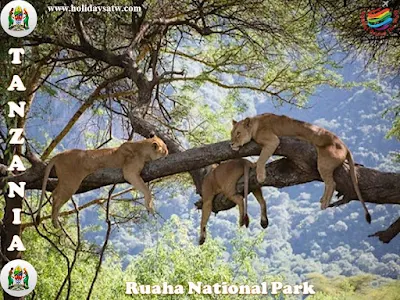 |
| Ruaha National Park, Tanzania |
Ruaha National Park became the largest national park in Tanzania when its
borders were expanded in 2008, and today it houses 10% of the total lion
population in the world along with the largest concentration of elephants
in Tanzania. The Mountainous area, vast pastures, and famous baobab trees.
Ruaha National Park, Tanzania location on Google Maps
Tarangire National Park, Tanzania
 |
| Tarangire National Park, Tanzania |
Tarangire National Park was established in 1970, it is one of the
lesser-known reserves in Tanzania, Tarangire rivals the Serengeti in its
great number and diversity of wildlife. and includes many migratory
animals, especially elephants, and more than 300 species of birds. It is a
good choice for travellers who wish to encounter more animals and fewer
tourists while on safari. The Tarangire National Park is known as a
wonderful birding destination. also features large numbers of games,
particularly during the dry season, when the Tarangire River is the only
source of water in the area. The landscape is of particular interest too,
due to the high number of scenic baobab trees.
Why Visit Tarangire National Park?
- Embark on a walking safari and marvel at ancient baobabs.
- Discover hundreds of ancient rock paintings in the vicinity of
Kolo.
- Tarangire is famous for having herds of up to 300 elephants.
An often-overlooked gem, Tarangire’s characteristic skyline, framed by
the stubby branches of fat baobab trees, is the backdrop for superb game
viewing, particularly in the winter months of the peak season. Its
marshes, which dry out into verdant grassy fields during the dry season,
draw great herds of elephants, Buffalo, and Antelope. Lions and other predators
are frequently spotted.
The park boasts over 500 species of birds, including some species endemic
to Tanzania. The southern end of the park is home to camps that
specialize in walking safaris, allowing their guests to immerse their
senses in the experience of exploring the African bush on foot.
Tarangire National Park, Tanzania location on Google Maps
Ngorongoro Conservation Area, Tanzania
 |
| Ngorongoro Conservation Area, Tanzania |
Ngorongoro Reserve is a UNESCO World Heritage Site located in western
Arusha in the Crater Highlands region of Tanzania and is administered by
the Tanzanian government.
Ngorongoro is home to unparalleled beauty and immaculate nature. It is
the only reserve in Tanzania that provides protection for wildlife in
the presence of tourists. Land use is controlled to prevent negative
impacts on wildlife. It also includes open grass pastures, mountain
forests, and low-tree forests. The land of a high Bora weighs 8,292 km
and is the largest crater in the world, which has a height of 2,286
meters above sea level.
The Ngorongoro Reserve is home to one of the most amazing safari
experiences in Africa with its wide range of wildlife and is one of the
most important areas in Africa where you can see endangered animals such
as the black rhino.
Ngorongoro World Heritage place
This reserve is considered the eighth wonder of the world, as it has
been listed by UNESCO as one of the natural and cultural heritage sites
of the world at the same time. It enjoys rare wildlife and includes
among its sides the footprints of primitive people on the ground, and
the reserve includes three wonderful volcanic craters and more than 5308
km A square of savannah, dense forests and African jungles, it is one of
the few areas in the world with peaceful wildlife where the Maasai
people live alongside diverse wildlife, the region is also the official host for the migration of more than
2,500,000 wild animals, zebra, buffalo and gazelle.
They make their way through Ngorongoro every year between
December and June and the reserve is home to more than 500 different
species of birds.
Things to do in Ngorongoro Reserve
The reserve contains many open areas to visit, such as the elephant
cave, which is entered for a ticket, the Masai Spa, which is based on an
ancient and different style with natural herbal materials, and the dense
forests that you can roam in safely and you can eat what you want from
fresh fruits and vegetables.
Spend a day on a crater safari, pausing for a special lunch in the
bush. Visitors can also hike at Olmuti Volcano, hike the Embakai Crater
Lake (where pink flamingos flock in the shallows) or visit the village
of Ngorongoro to learn about Maasai culture.
Hiking in the wide green spaces spread in the reserve guarantees you a
wonderful time to relax calm down and enjoy the fresh, cool outdoor
air.
For lovers of photography and amateurs, during your visit to the
park, you will get a group of wonderful and distinctive shots of a
mixture of different trees and animals.
Ngorongoro Conservation Area, Tanzania location on Google Maps
Selous Game Reserve, Tanzania
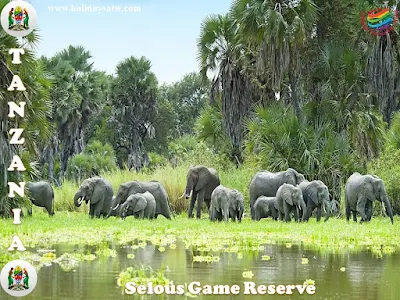 |
| Selous Game Reserve, Tanzania |
Selous Game Reserve is one of the most beautiful places for tourism in
Tanzania, it has the largest concentration of elephants in Africa, many
lions live in it, and it is one of the most diverse ecological life.
Selous Game Reserve contains a series of steep cliffs, large open
grasslands, forests, rivers, hills and plains.
"Selous Game Reserve" is the destination for lovers, where complete calm
and extreme privacy in the lap of nature, as it is the interface for
everyone who tries to escape from the noise of modern life, and the
reserve abounds with a huge wealth of wildlife, covering an area of 55
thousand square km, and lives in it. More than 50,000 elephants and more
than 400 species of birds.
Selous Game Reserve, Tanzania location on Google Maps
Olduvai Gorge, Tanzania
 |
| Olduvai Gorge, Tanzania |
Olduvai Gorge is an archaeological site with ancient skulls and bone
fragments that provided important information about early humanity. An
interesting find is the famous footprints of a man, woman and child in
Lytoli, near Olduvai. These and other discoveries provide more evidence
for the theory that at least three species of humans existed in this
region over two million years ago.
Olduvai Gorge, Tanzania location on Google Maps
Cultural Tourism in Tanzania

|
|
Cultural Tourism in Tanzania
|
With over 120 different tribes residing in Tanzania, there is a lot of
local history to be discovered in all regions of Tanzania.
The people of Tanzania are among the most welcoming and friendly people
on earth with diverse and unique cultures and willing to share with
visitors. Where you can wander through the scenic, natural and cultural
local villages to meet the friendly faces from Tanzania and learn about
their ways of life.
Various local communities run their own cultural programs and welcome
visitors into their homes, bringing direct income into the local
community while giving local residents a chance to showcase their way of
life to the outside world. This creates mutual understanding and
friendships between tourists and locals, offering tourists from all over
the world the possibility to experience the cultural diversity of
Tanzania and providing local people in various rural areas with an
opportunity to build sustainable livelihoods.
With local guides born and raised in the area, you can discover the
steps needed to grow fresh aromatic coffee from picking, drying,
roasting and drinking. Get involved in the process personally before
enjoying the taste and taking a very personal pocket of Tanzanian
coffee.

|
|
Ndali and Matengo dancers
|
Follow the famous drum beat and let the Ndali and Matengo dancers from
southern Tanzania interpret the music and performances they have
inherited from their ancestors. Sample the local cuisine, with all the
culinary variations of Ugali, Mlenda, Machalari, Makande, Matoke, Pilau
and Nyamachoma. Learn how to cook a wide variety of African cuisine and
make authentic handicrafts.
Cultural tours can be half-day excursions or extended stays of a few
days among the locals in their home villages and towns. Depending on how
much time and interest you have, you can choose to embark on a boat ride
on a river or on one of the many lakes while listening to legendary
tales. Paddle through mangroves or sail with fishermen to the pristine
sandy islands of the Indian Ocean, Lake Nyasa and Lake Victoria. Meet
the Hadza hunters or spend part of your vacation with the friendly
residents of Switzerland, and Tanzania, while hiking through the Usambara
Mountains.
Important tips before travelling to Tanzania
- Avoid walking in quiet areas alone during the night to avoid exposure
to cases of theft and kidnapping.
- Avoid going to troubled areas, conflict areas and demonstrations.
- Avoid contaminated water and only drink from packed bottles.
- Keep a copy of your official papers and the necessity of copying more
than one copy.
- The CDC recommends that all visitors to Tanzania be vaccinated
against hepatitis A and typhoid. Vaccines may be cholera, hepatitis B,
rabies and malaria. Especially if you are travelling during the rainy
season when mosquitoes are most prevalent.






